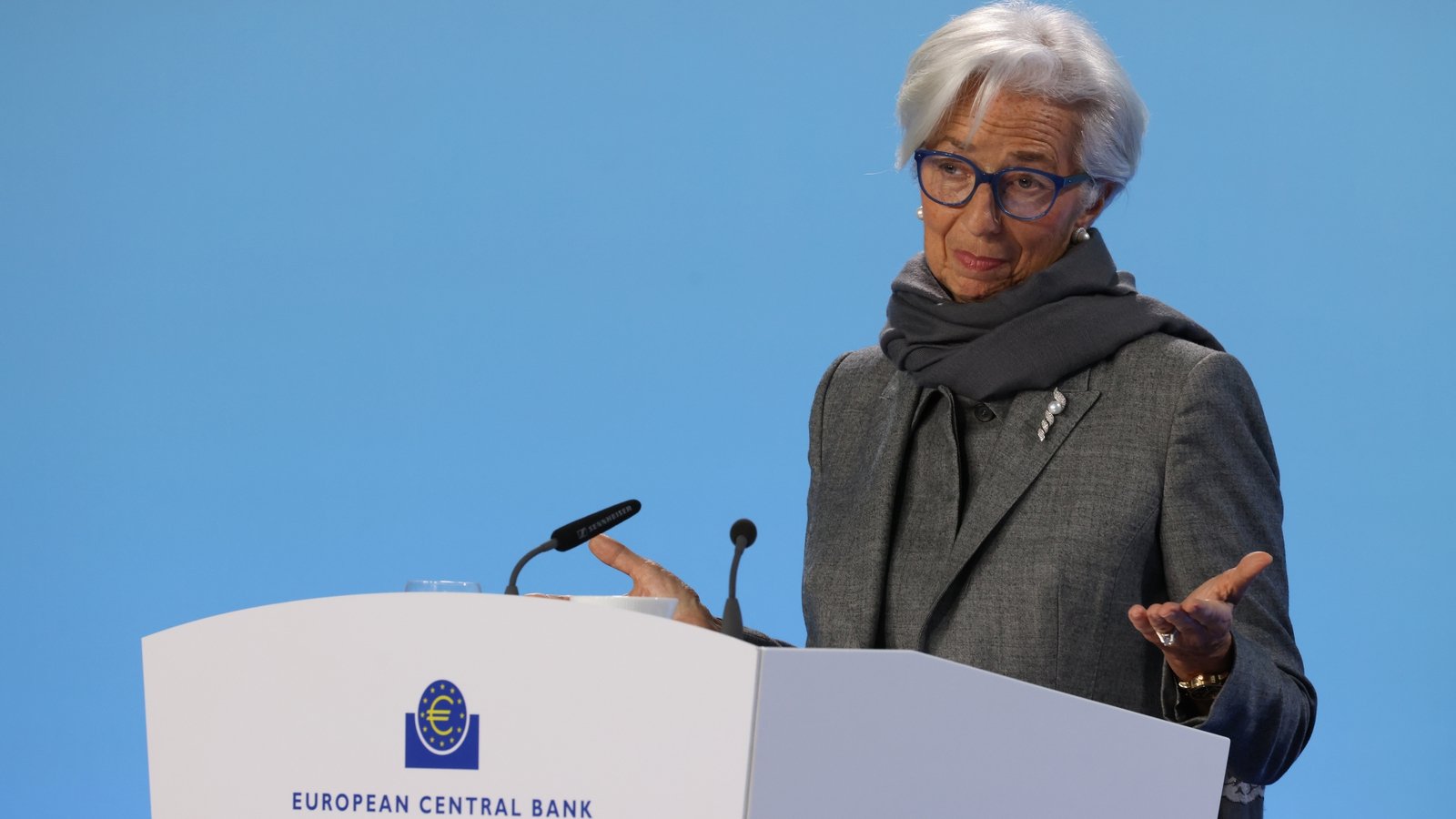Is March looking too optimistic for an ECB rate cut?

Metaphorical champagne corks were popping on market trading floors as the ‘flash estimate’ of eurozone inflation for November was published at the end of that month.
The annual rate of consumer price rises – at 2.4% – was back within striking distance of the European Central Bank’s 2% inflation target, having fallen sharply in the month.
The situation was mirrored in the US where inflation dropped to 2.6%. It had peaked at over 9%.
US Federal Reserve chair Jerome Powell issued the usual caveats at the bank’s December meeting, but he gave very firm indications that US interest rates would start to fall back in 2024.
There was an element of ‘mission accomplished’ about it from the markets.
Stocks soared with some indexes hitting all time highs. It was ‘game on’ for interest rate cuts with firm expectations that the ECB would be the first major Central Bank to be cutting rates as soon as March.
Not so fast….
The ECB did not play ball, with President Christine Lagarde saying at the bank’s December meeting that the Governing Council had not even discussed the prospect of cutting rates.
She stuck firmly to the mantra that borrowing costs would remain ‘higher for longer’, despite lower inflation expectations.
Governing Council member Robert Holzmann doubled down on that warning, saying a move downwards on rates in 2024 was anything but guaranteed.
ECB chief economist Philip Lane – a former Governor of the Irish Central Bank – also said it was too early to talk about the prospect of rate cuts, adding that it was premature to declare victory over inflation.
Speaking at an ESRI event just before Christmas, he warned about inflation not moving in a straight line and indicated that the rate could temporarily increase in December.
December surprise
As the new year approached, there was a distinctive rowing back by analysts and economists on the prospect of a March rate cut from the ECB.
The focus appeared to switch to April or June, with some pushing the possibility of a first rate cut out to September.
The bets against a March cut intensified as the December inflation figures, published yesterday, confirmed that the rate of inflation had indeed jumped in December and was back at close to 3%.
Some of it was accounted for by so-called ‘base effects’ and ‘technical factors’, such as the ending of government subsidies in some of the bigger economies.
Nonetheless, it did appear to bring the rate-cutting party to a full stop.
Global equities snapped a nine-week winning streak and there was a selloff of government bonds as yields (the interest rate on debt) were pushed back up.
Analysts at Citi wrote in a research note that expectations of early rate cuts had been overdone.
“The rally has been Fed-led, and the ECB meeting in December guides towards a cut mid-2024 at the earliest,” they said.
“Inflation is far from being defeated,” Commerzbank economist Christoph Weil noted.
“The ECB is likely to cut its key interest rates significantly less than the market currently expects,” he concluded.

Precarious global picture
Future interest rate moves in Europe will be dictated to a large extent by global events and wage movements.
Although inflation has fallen back substantially, many workers argue that they are playing catchup, with price increases far outpacing wage hikes to date.
With an extremely tight labour market, some employees are getting their way and commanding impressive pay increases. That, in turn, can drive inflation via the classic ‘wage-price spiral’.
There is also the potential impact from two major international conflicts on Europe’s doorstep.
Although the outbreak of war in Ukraine saw oil prices surging – driving inflation towards double digit territory – the conflict in the Middle East has so far failed to have any meaningful impact on oil prices.
The decision by some shipping companies to redirect fleets around the southern tip of Africa to avoid attacks from Houthi rebels in the Red Sea could yet impact supply chains, possibly driving inflation back up, as well as oil prices.
The growth conundrum
Part of the reason as to why oil prices are failing to gain momentum is that traders believe growth is slowing globally and that demand for the commodity will be vastly less than previously thought.
And this is where the prospect of a resumption of the rate-cutting party emerges.
Many major economies are performing poorly, including China, where growth failed to take off to the extent that had been expected following the lifting of Covid restrictions.
Europe’s biggest economy, Germany, is also struggling and has recently taken on the moniker of the ‘sick man of Europe’.
That could force the European Central Bank into early action, as Paul Sommerville of Sommerville Advisory Markets points out.
He said the markets simply don’t believe the mantra from Central Banks that they will not cut rates this year.
“The markets set interest rates. Central banks do not,” he said.
“They believe the world economy is slowing. China is slowing down, Europe’s economy is slowing down,” he pointed out.
“We’re in a situation where all rates will be cut aggressively.”
What does it mean for mortgages?
Tracker mortgage holders will have been pinning their hopes on a March rate cut.
Having borne the brunt of each of the ten successive hikes from the ECB between July 2022 and last September, they will in turn automatically get the immediate benefit of any rate reduction.
Some of the 70,000 mortgage holders who are scheduled to come off fixed rates in the next year will similarly have been relieved at the prospect of interest rates coming down.
Even with a full percent coming off the base borrowing rate, they would still likely be looking at vastly higher monthly repayments.
However, it must be pointed out that even if rates do come down, there is no guarantee that the banks will pass the cuts fully on to their non-tracker mortgage products.
“The main Irish banks passed on less than half of the ECB rate hikes,” Daragh Cassidy, Head of Communications at bonkers.ie says, although he acknowledged that rates were already high here to start with.
“It does mean it’s unlikely we’ll see the main banks responding to the ECB rate cuts immediately. Indeed some of the main lenders may even hike some of their variable and fixed rates again in the New Year.
“And if the ECB only cuts rates by 0.25 or 0.5 percentage points next year, the banks may not reduce their rates at all. At least initially,” he cautions.
Talk of 2024 being the year of declining borrowing costs may have been greatly exaggerated.





